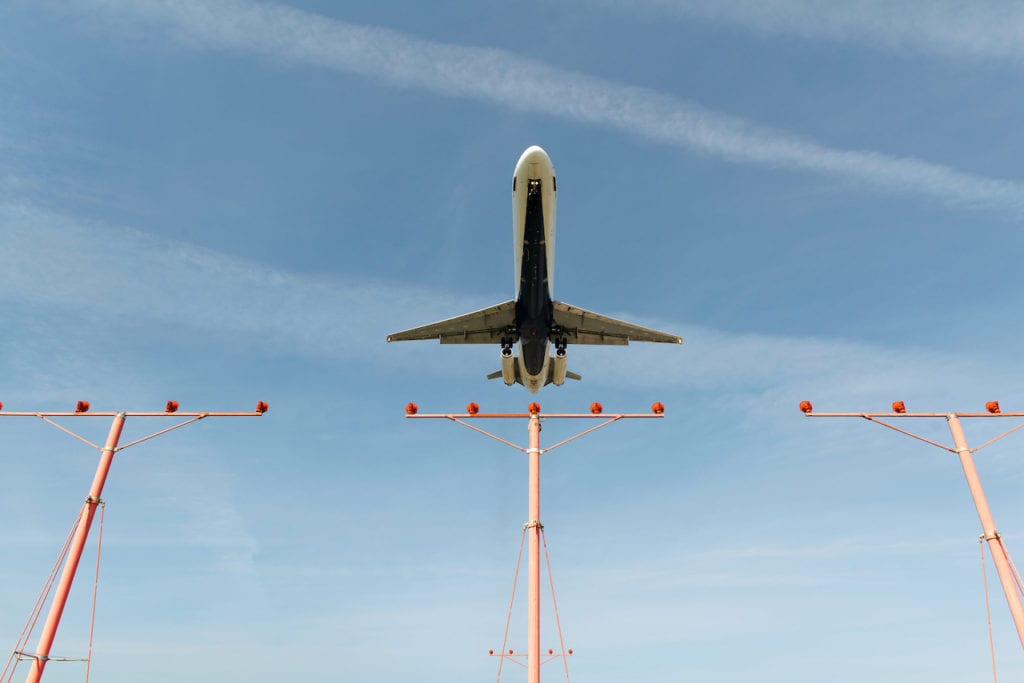
Delta Air Lines has removed 600 aircraft from active service and plans on permanently retiring 100, including the MD-88 fleet, one of which is pictured here. (Delta Air Lines)
Delta Air Lines has permanently retired 100 aircraft and removed another 600 from active commercial service, while also delaying and canceling some future planned deliveries according to the international carrier’s July 14 second quarter earnings call.
Between April and June, Delta reported a net loss of $5.7 billion due to COVID-19 travel restrictions, passenger refunds, fleet impairment charges and a collection of other costs that include order cancellations associated with bankruptcy filings of major airlines that it holds ownership stake in. The loss was Delta’s largest since 2008, with a large portion due to drop in domestic passenger revenue that began, which was down by 93 percent compared to the second quarter of 2019.
Over the next few years, Delta will accelerate fleet retirement for their entire MD-88, MD-90, Boeing 777 and 737-700 fleets along with portions of the 767-300ER and Airbus A320 fleets as well. Future purchases for four Airbus A350s scheduled to be delivered to LATAM – the Chile-based carrier where Delta holds a 20 percent ownership stake – have been cancelled. The cancellation included a $62 million termination fee.
Both LATAM and Aeromexico, another Latin airline that Delta holds an ownership stake within, have filed for US Chapter 11 Bankruptcy protection. The airline’s ownership stake in Virgin Atlantic is also suffering as the U.K.-based carrier is working through an out-of-court recapitalization, according to Delta Air Lines CEO Ed Bastian.
Two other subsidiary U.S. regional operators, Compass and GoJet, which both had contracts operating for Delta through the end of 2020, also ceased operations in April.
“The 777 fleet for us was the sub fleet that made the most sense to sit down. We certainly have additional international capable aircraft. We have a very large 767 fleet with opportunities to early retire as we get a better sense for where the recovery is,” Bastian said during a question and answer session with analysts.
There are also ongoing discussions with Airbus on other future aircraft deliveries.

Members of Delta’s line maintenance crew disinfect the surfaces of the cabin including tray tables, seat backs and in-flight entertainment screens in a Boeing 757. Delta says this is one of the ways it is enhancing cleaning procedures in cabins between flights. Photo: Delta Air Lines
“We are working with Airbus, as you can appreciate, and they’ve been very good partners with us managing the crisis. Clearly, we’re in a situation where we don’t need any aircraft, we have a lot of aircraft on the ground and doing our best to manage through the next 18 to 24 months to minimize deliveries. We’re not ready to make any announcements yet. I can assure you there will be no cash CapEx on any aircraft at Delta for some period of time, certainly through the end of this year,” Bastian said.
Parking more than 700 aircraft helped reduce fuel expenses by $1.9 billion compared to the same period a year ago, and maintenance expenses were also down by 90 percent during the quarter. According to Delta’s 10-Q filing, the majority of capital expenditures during the first six months of June came in the form of “purchases of aircraft, fleet modifications and technology enhancements prior to the onset of the COVID-19 pandemic.”
“In order to preserve liquidity throughout the COVID-19 pandemic, we are deferring substantially all of our previously planned 2020 capital expenditures,” Delta said in the filing.
More than 40,000 employees, out of Delta’s workforce of 91,000, have also helped reduce salaries and benefits expenses for the airline by taking voluntary unpaid leaves.
A number of steps were also taken during the second quarter to improve social distancing onboard Delta flights, where a commitment has been made to block middle seats through September and cap load factors at 60 percent. Partnerships have also been formed with the Mayo Clinic and Quest Diagnostics to provide COVID-19 testing for Delta employees.
Masks are also being required onboard and Delta has also released a video featuring Dr. Michael Saag, Professor of Medicine and Infectious Diseases at the University of Alabama at Birmingham, explaining how the cabin air filtration system on its aircraft keeps in-flight air clean for passengers.
“The international trips that we’ve all been on where we’ve flown over to Europe for a two-hour meeting and flown back that does nothing but beat you up can certainly be much easily better accommodated over a video call,” Bastian said. “It will take some time to get back. I don’t think we’ll ever get back entirely to where we were in 2019 on the volume of business traffic, but the resiliency of the business traffic that we are going to now bake into our business model going forward I think will be a better way to measure the sustainability of the recovery.”